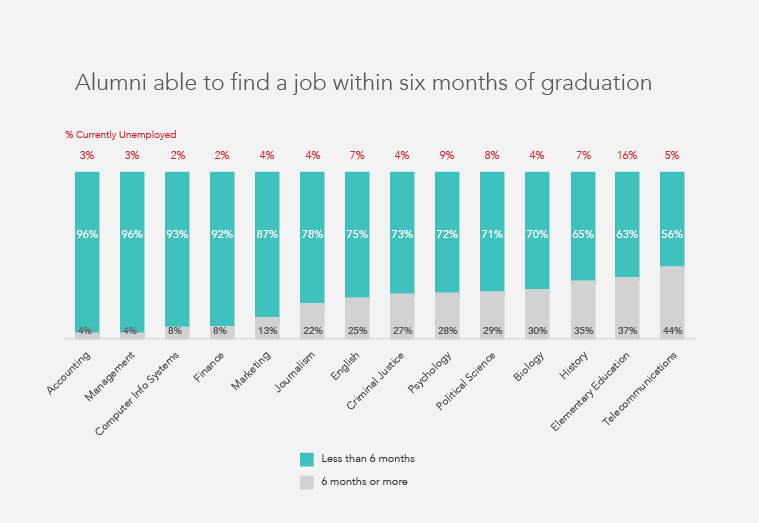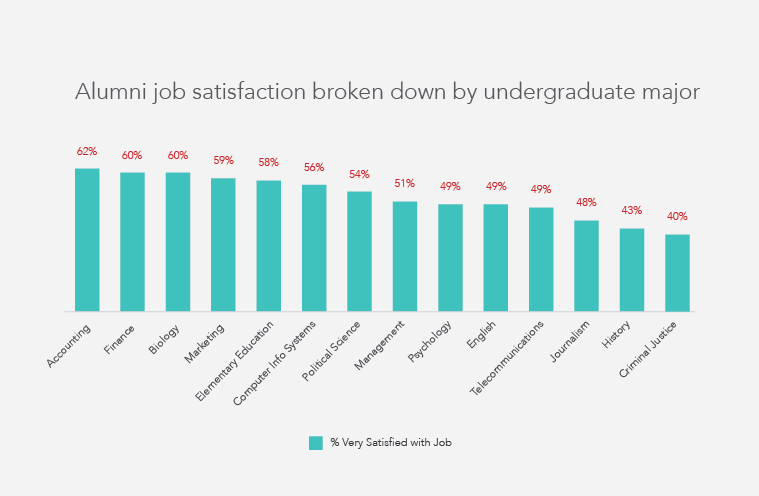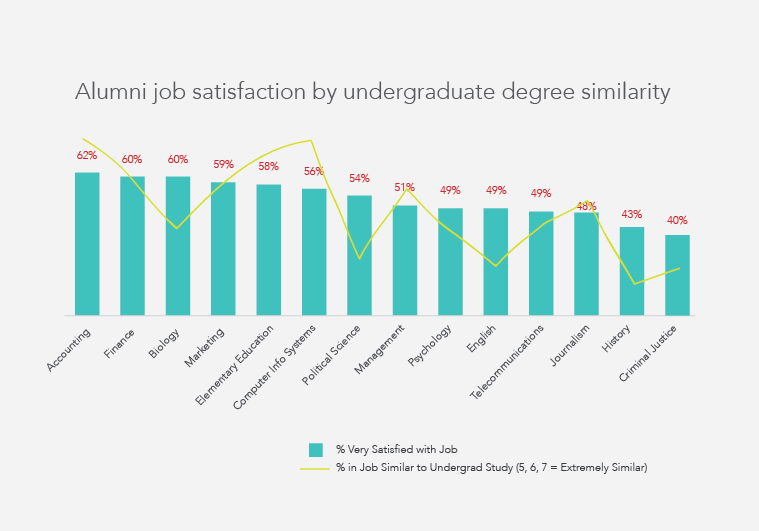In a recent Wake-Up Call, we made the case that undergraduate majors matter. Recent surveys of alumni, both young and old, from two major research universities showed that they are just as likely to be in jobs totally unrelated to their majors as jobs that are closely related. More significantly, those with jobs unrelated to their undergraduate studies reported lower job satisfaction on average.
In response to this piece, many readers asked us how this effect might vary by major. How do outcomes differ among marketing majors and psychology majors, for example? What is the likelihood that marketing majors and psychology majors have jobs related to the disciplines they studied? How satisfied are they with their jobs?
To begin answering these questions, we reexamined the data from the same outcomes study discussed in our last Wake-Up Call on this subject. This study consisted of a survey of alumni in which respondents provided basic information about their lives since graduation (e.g., additional degrees earned, employment status, etc.) and shared perceptions about the institution and the education they received (e.g., soft skills earned, likelihood to recommend the school, etc.).
Once again, the data tells a compelling story. For the alumni of this institution, job outcomes such as employability, the length of time it takes to get a job, the likelihood of finding a similar job, and job satisfaction vary widely by major. If the results of this survey are similar across other institutions, these findings could have implications for students choosing their majors and the college administrators who advise them.
First, take a look at how employment rates and the proportion of alumni who were able to find a job within six months of graduation vary by major:
 For these alumni, some majors have been more “employable” than others. Marketing majors were able to find a job more quickly, on average, than biology majors, and accounting majors fared best of all.
Of course, universities should care about alumni not only getting jobs, but also holding satisfying jobs. This too appears to significantly vary by major.
For these alumni, some majors have been more “employable” than others. Marketing majors were able to find a job more quickly, on average, than biology majors, and accounting majors fared best of all.
Of course, universities should care about alumni not only getting jobs, but also holding satisfying jobs. This too appears to significantly vary by major.
 At this institution, accounting and finance majors are more satisfied with their jobs, on average, than history and criminal justice majors.
Now let’s return to the question that first inspired our Wake-Up Call: does job similarity to undergraduate studies vary significantly by major? Perhaps not surprisingly, it does. Over two-thirds of accounting, computer information systems or elementary education majors are currently in a field that is similar to their undergraduate studies, compared to less than one-third of political science, English, criminal justice and history majors.
At this institution, accounting and finance majors are more satisfied with their jobs, on average, than history and criminal justice majors.
Now let’s return to the question that first inspired our Wake-Up Call: does job similarity to undergraduate studies vary significantly by major? Perhaps not surprisingly, it does. Over two-thirds of accounting, computer information systems or elementary education majors are currently in a field that is similar to their undergraduate studies, compared to less than one-third of political science, English, criminal justice and history majors.
 Among n=2,168 full-time employed respondents / At least n=59 in each category
To recap, among over 5,000 alumni of this institution, several important outcomes vary significantly by undergraduate major, including: 1) employability following graduation, 2) job satisfaction, and 3) the likelihood that their job relates to their undergraduate studies.
But one larger question remains: are these effects related? Are accounting majors more satisfied with their jobs because they were more likely to find jobs in their field? Or are accountants more likely to be satisfied with their jobs for other reasons? While the data cannot determine this potential cause-and-effect relationship, it suggests there is some truth to the idea that similarity of major to job may play a significant role in job satisfaction.
Among n=2,168 full-time employed respondents / At least n=59 in each category
To recap, among over 5,000 alumni of this institution, several important outcomes vary significantly by undergraduate major, including: 1) employability following graduation, 2) job satisfaction, and 3) the likelihood that their job relates to their undergraduate studies.
But one larger question remains: are these effects related? Are accounting majors more satisfied with their jobs because they were more likely to find jobs in their field? Or are accountants more likely to be satisfied with their jobs for other reasons? While the data cannot determine this potential cause-and-effect relationship, it suggests there is some truth to the idea that similarity of major to job may play a significant role in job satisfaction.
 For these alumni, some majors have been more “employable” than others. Marketing majors were able to find a job more quickly, on average, than biology majors, and accounting majors fared best of all.
Of course, universities should care about alumni not only getting jobs, but also holding satisfying jobs. This too appears to significantly vary by major.
For these alumni, some majors have been more “employable” than others. Marketing majors were able to find a job more quickly, on average, than biology majors, and accounting majors fared best of all.
Of course, universities should care about alumni not only getting jobs, but also holding satisfying jobs. This too appears to significantly vary by major.
 At this institution, accounting and finance majors are more satisfied with their jobs, on average, than history and criminal justice majors.
Now let’s return to the question that first inspired our Wake-Up Call: does job similarity to undergraduate studies vary significantly by major? Perhaps not surprisingly, it does. Over two-thirds of accounting, computer information systems or elementary education majors are currently in a field that is similar to their undergraduate studies, compared to less than one-third of political science, English, criminal justice and history majors.
At this institution, accounting and finance majors are more satisfied with their jobs, on average, than history and criminal justice majors.
Now let’s return to the question that first inspired our Wake-Up Call: does job similarity to undergraduate studies vary significantly by major? Perhaps not surprisingly, it does. Over two-thirds of accounting, computer information systems or elementary education majors are currently in a field that is similar to their undergraduate studies, compared to less than one-third of political science, English, criminal justice and history majors.
 Among n=2,168 full-time employed respondents / At least n=59 in each category
To recap, among over 5,000 alumni of this institution, several important outcomes vary significantly by undergraduate major, including: 1) employability following graduation, 2) job satisfaction, and 3) the likelihood that their job relates to their undergraduate studies.
But one larger question remains: are these effects related? Are accounting majors more satisfied with their jobs because they were more likely to find jobs in their field? Or are accountants more likely to be satisfied with their jobs for other reasons? While the data cannot determine this potential cause-and-effect relationship, it suggests there is some truth to the idea that similarity of major to job may play a significant role in job satisfaction.
Among n=2,168 full-time employed respondents / At least n=59 in each category
To recap, among over 5,000 alumni of this institution, several important outcomes vary significantly by undergraduate major, including: 1) employability following graduation, 2) job satisfaction, and 3) the likelihood that their job relates to their undergraduate studies.
But one larger question remains: are these effects related? Are accounting majors more satisfied with their jobs because they were more likely to find jobs in their field? Or are accountants more likely to be satisfied with their jobs for other reasons? While the data cannot determine this potential cause-and-effect relationship, it suggests there is some truth to the idea that similarity of major to job may play a significant role in job satisfaction.
The Bottom Line
It is important to remember that this data is by no means nationally representative, and there are surely other factors at work. Nonetheless, it further emphasizes the premise that if alumni want jobs relevant to their studies, want to stay employed, and want satisfying work, their undergraduate majors likely matter more than we think. As a result, Eduventures recommends that your institution take the following steps:- Ensure advisors are sending the right message about college majors. Current conventional wisdom could lead many college advisors and mentors to downplay the importance of the college major and students’ abilities to secure related jobs. While students should not necessarily be discouraged from choosing majors and jobs that may not match, advisors should avoid perpetuating the myth that college majors are largely inconsequential.
- Incorporate “career pathing” into career services. Helping students get jobs is not enough. Colleges and universities should prioritize helping students consider careers that closely incorporate their studies at the undergraduate level.
- Ensure your institution is collecting data on job similarity and satisfaction. Outcomes data is as important as ever, not only for federal and state governments to hold institutions accountable, but also for institutions to understand their true impact on their graduates’ lives. Nonetheless, many institutions are simply gathering data on employment rates. Strongly consider collecting data that tells a more complete story of career outcomes, including data related to how similar students’ jobs are to their majors, how long it took them to acquire jobs after graduation, and how satisfied they are with their work. Gathering this additional data is essential to understand your institution’s true impact and how it can optimize its advisory services.
- Identify and be able to inform students about the majors with the best outcomes. Eduventures outcomes studies indicate that employment rates and the likelihood that alumni found jobs in fields related to their studies vary widely by students’ areas of concentration. Institutions should gather program-specific outcomes data and be able to inform students about the industries in which alumni have had the greatest success in finding jobs relevant to their studies.
- Consider partnering with vendors to capture and utilize outcomes data. Vendors of career advising technology solutions can help your institution by providing a platform for delivering better advising services that leverage outcomes data on majors. These solutions provide collaborative tools for employers to meet with students and communicate details about work experiences among employees with similar majors. This also makes data collection on outcomes easier by allowing employers that hire your graduates to report employment data directly to your institution.
